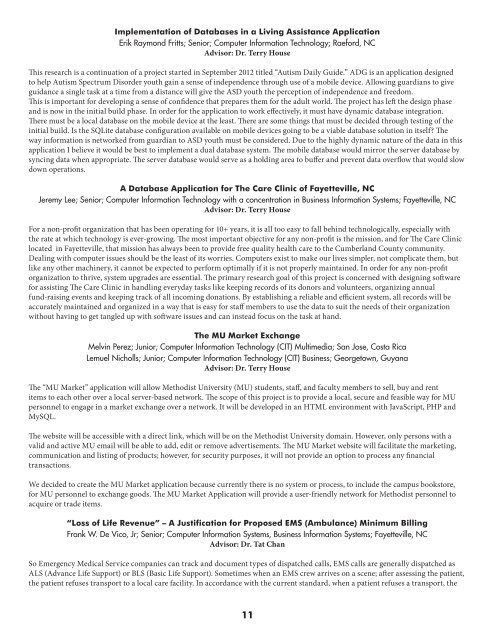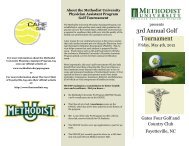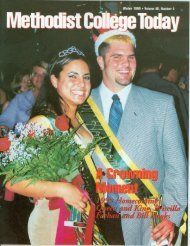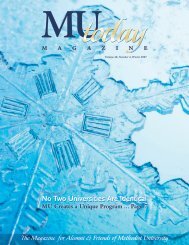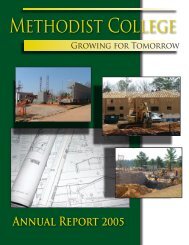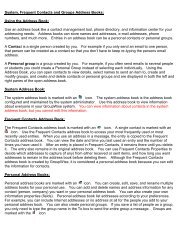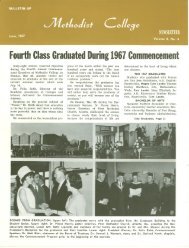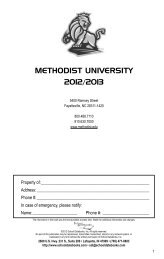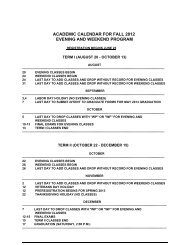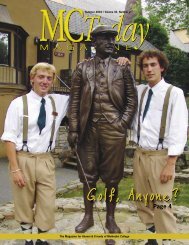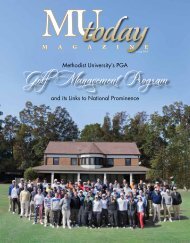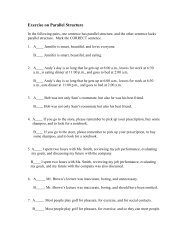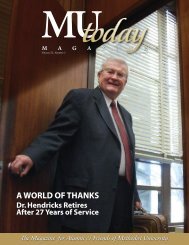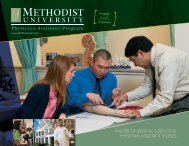Session Abstracts - Methodist University
Session Abstracts - Methodist University
Session Abstracts - Methodist University
You also want an ePaper? Increase the reach of your titles
YUMPU automatically turns print PDFs into web optimized ePapers that Google loves.
Implementation of Databases in a Living Assistance Application<br />
Erik Raymond Fritts; Senior; Computer Information Technology; Raeford, NC<br />
Advisor: Dr. Terry House<br />
This research is a continuation of a project started in September 2012 titled “Autism Daily Guide.” ADG is an application designed<br />
to help Autism Spectrum Disorder youth gain a sense of independence through use of a mobile device. Allowing guardians to give<br />
guidance a single task at a time from a distance will give the ASD youth the perception of independence and freedom.<br />
This is important for developing a sense of confidence that prepares them for the adult world. The project has left the design phase<br />
and is now in the initial build phase. In order for the application to work effectively, it must have dynamic database integration.<br />
There must be a local database on the mobile device at the least. There are some things that must be decided through testing of the<br />
initial build. Is the SQLite database configuration available on mobile devices going to be a viable database solution in itself? The<br />
way information is networked from guardian to ASD youth must be considered. Due to the highly dynamic nature of the data in this<br />
application I believe it would be best to implement a dual database system. The mobile database would mirror the server database by<br />
syncing data when appropriate. The server database would serve as a holding area to buffer and prevent data overflow that would slow<br />
down operations.<br />
A Database Application for The Care Clinic of Fayetteville, NC<br />
Jeremy Lee; Senior; Computer Information Technology with a concentration in Business Information Systems; Fayetteville, NC<br />
Advisor: Dr. Terry House<br />
For a non-profit organization that has been operating for 10+ years, it is all too easy to fall behind technologically, especially with<br />
the rate at which technology is ever-growing. The most important objective for any non-profit is the mission, and for The Care Clinic<br />
located in Fayetteville, that mission has always been to provide free quality health care to the Cumberland County community.<br />
Dealing with computer issues should be the least of its worries. Computers exist to make our lives simpler, not complicate them, but<br />
like any other machinery, it cannot be expected to perform optimally if it is not properly maintained. In order for any non-profit<br />
organization to thrive, system upgrades are essential. The primary research goal of this project is concerned with designing software<br />
for assisting The Care Clinic in handling everyday tasks like keeping records of its donors and volunteers, organizing annual<br />
fund-raising events and keeping track of all incoming donations. By establishing a reliable and efficient system, all records will be<br />
accurately maintained and organized in a way that is easy for staff members to use the data to suit the needs of their organization<br />
without having to get tangled up with software issues and can instead focus on the task at hand.<br />
The MU Market Exchange<br />
Melvin Perez; Junior; Computer Information Technology (CIT) Multimedia; San Jose, Costa Rica<br />
Lemuel Nicholls; Junior; Computer Information Technology (CIT) Business; Georgetown, Guyana<br />
Advisor: Dr. Terry House<br />
The “MU Market” application will allow <strong>Methodist</strong> <strong>University</strong> (MU) students, staff, and faculty members to sell, buy and rent<br />
items to each other over a local server-based network. The scope of this project is to provide a local, secure and feasible way for MU<br />
personnel to engage in a market exchange over a network. It will be developed in an HTML environment with JavaScript, PHP and<br />
MySQL.<br />
The website will be accessible with a direct link, which will be on the <strong>Methodist</strong> <strong>University</strong> domain. However, only persons with a<br />
valid and active MU email will be able to add, edit or remove advertisements. The MU Market website will facilitate the marketing,<br />
communication and listing of products; however, for security purposes, it will not provide an option to process any financial<br />
transactions.<br />
We decided to create the MU Market application because currently there is no system or process, to include the campus bookstore,<br />
for MU personnel to exchange goods. The MU Market Application will provide a user-friendly network for <strong>Methodist</strong> personnel to<br />
acquire or trade items.<br />
“Loss of Life Revenue” – A Justification for Proposed EMS (Ambulance) Minimum Billing<br />
Frank W. De Vico, Jr; Senior; Computer Information Systems, Business Information Systems; Fayetteville, NC<br />
Advisor: Dr. Tat Chan<br />
So Emergency Medical Service companies can track and document types of dispatched calls, EMS calls are generally dispatched as<br />
ALS (Advance Life Support) or BLS (Basic Life Support). Sometimes when an EMS crew arrives on a scene; after assessing the patient,<br />
the patient refuses transport to a local care facility. In accordance with the current standard, when a patient refuses a transport, the<br />
11


